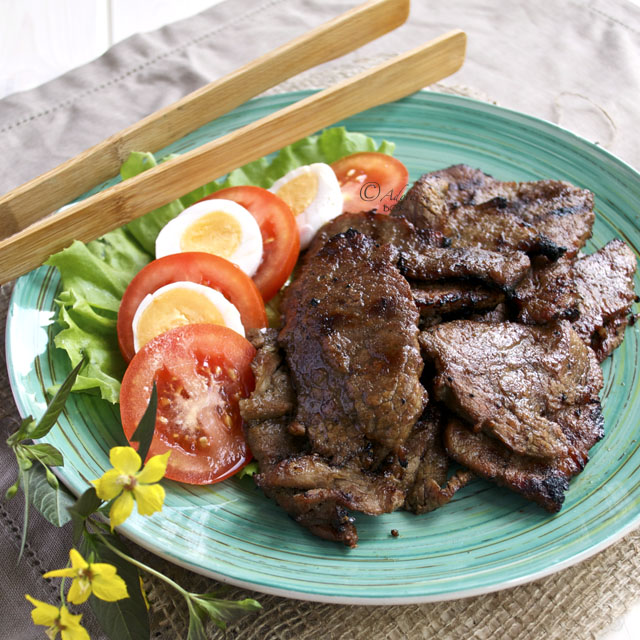Salted eggs can be bought ready prepared. It is sometimes sold in the Oriental shops salted but uncooked. In the Philippines, it is sold already cooked and coloured a very deep pink to differentiate it from chicken eggs. We call it itlog na maalat which simply means salty eggs.
They are traditionally buried in salty clay for several days after which they absorb the salty taste through their porous shells. The egg whites are salty and creamy and the egg yolks are firm, bright yellow and rich tasting, with oil exuding from them after boiling. The whole egg yolks are prized by the Chinese and are used as filling for mooncakes to symbolize the moon.
It is a very common side dish by itself or can also be mixed with diced tomatoes as a kind of salsa to accompany fried dishes or added to salads to add a salty creamy taste similar to feta cheese. It is also used as a topping for rice cakes. Commercial salted eggs are sometimes far too salty for my liking. I sometimes make it at home so I can make it less salty.
Ingredients:
up to 12 duck eggs
5 cups of water
1 1/2 c. salt
red or dark pink food colouring
1 tbsp. vinegar
Instructions:
Bring 5 cups of water to a boil. Add 1 1/2 cups of salt and stir until most of the salt has dissolved. Leave the solution to cool, then transfer to a glass or plastic jar with a lid.
Make sure that the eggs are free from cracks. Add the eggs. The eggs has to be completely submerged in the liquid. Put a cup on top of the eggs and let it fill with liquid to weigh down the eggs and prevent them from floating to the surface.
Keep in a cool dark place (such as a cupboard) for 21 days. You can boil one egg at this point and taste it. If you want it saltier, you can keep it in the salt solution for a day or two more.
Drain the water off and rinse the eggs with water. You can store the eggs in the fridge like this and boil them before serving. You can also boil them all and keep in the fridge. They are preserved by the salting process and can last for several months in the fridge.
All rights reserved ©Adora's Box Copyright 2011.
Please support Adora's Box by making your Amazon.com and mymemories.com (use the code STMMMS55174) purchases from this site. Click on their respective banners to proceed to their websites. It will not cost you a single cent more but will help sustain this blog. Thank you.
You might also like
 |
Bibingka with Mozarella and Cheddar
(substitute the mozarella with salted eggs) |
 |
| Sweet and Spicy Beef Tapa |
 |
| Steamed Rice cake with Salted Eggs |





I've seen these before in my Asian market and never could figure out what I'd do with them. That pink color really got me interested. I love you can do them at home.
ReplyDelete-Gina-
I had my fair share of salted duck eggs in Malaysia, never would have thought you can make these at home. That's really cool!
ReplyDeleteMay I ask - do they smell when you remove the eggs from the salted water after a couple of days?
Hi Adora! I've seen these eggs! Like Gina said, I really didn't know how you would use/eat them. I like the idea of making them home to control the saltiness. I wonder why we don't have similar things in Japan... we aren't close enough geographically?!
ReplyDeleteThat's the good thing Emily, they don't smell at all at any time during the process. It's just like boiled eggs but with a different taste and texture.
ReplyDeleteIsn't it interesting, Nami, that the Asian countries' cuisine differ so much from each other even if we are all just hopping distance from each other? Which is really, really good, because now that we got to know each other's food we have so many different things to eat.
ReplyDeleteGina, it can be used in salads and salsas. It is just like salty, boiled egg but with a different texture. Not as scary as century egg :)
ReplyDeleteHow clever! I've not heard of anyone who makes salted eggs at home :) I love to use them in my cooking but always buy from stores. Have a good weekend, my friend!
ReplyDeleteAm I starting to sound like a broken record? Each time you post a picture on FB I say I've been craving that. It's true, though. In fact, I was looking for a couple of these eggs to buy this week but I couldn't find any. My dad used to make them, too.
ReplyDeleteNow I want some with lots of chopped tomatoes and of course, your inihaw the bangus! Yum!!!
Ryan & I love salted eggs, but just like you, we don't like it too salty, so we prefer homemade ones.
ReplyDeleteI like eating it with tomatoes as a side dish to daing na bangus. Sarap!
That's mine and both my girls' favs salted eggs esp. the yolks! Love them in our mooncakes (I always buy those with double yolks coz the 3 of us sure 'fight' over the yolks! LOL), our glutinous rice dumplings, salted egg crabs, prawns everything! (greedy pig right!) Heehee...
ReplyDeleteSo, they're colored deep pink to differentiate from chicken eggs, no wonder they're called as 'red eggs' in the Philippines. In Singapore, we also have the 'red egg' but it's chicken egg and we colored it red for special auspicious occasions like Babies' Full Mth, Chinese Traditional wedding Custom and our Lunar Birthdays. :)
Tks for sharing this 'Red Eggs Making Process' Adora! Enjoy your weekend! :D